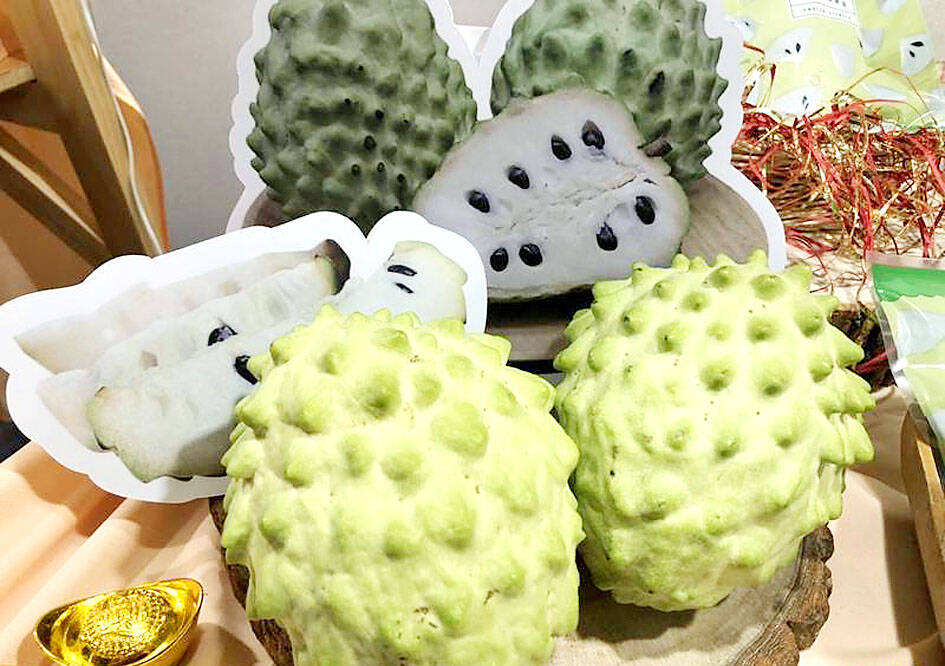Imports of Taiwan-grown custard apples would resume with immediate effect, China’s Taiwan Affairs Office (TAO) said yesterday, following a halt of about two years.
TAO spokeswoman Zhu Fenglian (朱鳳蓮) said in a statement that the decision to resume imports was made based on a report by Taitung County authorities detailing local farmers’ improved quarantine measures.
Imports were suspended in September 2021, with Chinese customs officials citing “repeated discovery of agricultural pests” in shipments of custard apples from Taiwan.

Photo: Yang Yuan-ting, Taipei Times
Taitung County Commissioner Yao Ching-ling (饒慶鈴) and Chinese Nationalist Party (KMT) Vice Chairman Andrew Hsia (夏立言), both of whom attended this year’s Straits Forum in Xiamen in China’s Fujian Province on Friday and Saturday, relayed the desire of custard apple growers in Taitung to export their crops to China, Zhu said.
A notice posted by the Chinese General Administration of Customs said that China had approved the registration of 25 orchards and three packing plants, all of which are based in Taitung.
Beijing’s favoritism toward the county is likely a reward for the Taitung County Government sending representatives to the Straits Forum, a central government official said in Taipei, adding that such perks would likely be limited to areas governed by the KMT.
The usual approach of the Chinese Communist Party is to ban imports of a product from Taiwan then funnel positive publicity toward the KMT after it sends a delegation to China to negotiate the lifting of the ban, said another official, speaking on condition of anonymity.
Agriculture and Food Agency Director-General Hu Jong-i (胡忠一) said he hoped China would soon recommence imports of other Taiwanese fruits that have been suspended over pest concerns, such as pineapples and wax apples.
The Council of Agriculture said that Taiwanese agricultural exporters used to rely heavily on the Chinese market, but have been making efforts to develop high-end products for other markets, especially the US and Japan.
In 2018, 23.2 percent of Taiwan’s agricultural exports went to China, but last year that figure fell to 12.9 percent, council data showed.

Chinese Nationalist Party (KMT) Chairman Eric Chu (朱立倫), spokeswoman Yang Chih-yu (楊智伃) and Legislator Hsieh Lung-chieh (謝龍介) would be summoned by police for questioning for leading an illegal assembly on Thursday evening last week, Minister of the Interior Liu Shyh-fang (劉世芳) said today. The three KMT officials led an assembly outside the Taipei City Prosecutors’ Office, a restricted area where public assembly is not allowed, protesting the questioning of several KMT staff and searches of KMT headquarters and offices in a recall petition forgery case. Chu, Yang and Hsieh are all suspected of contravening the Assembly and Parade Act (集會遊行法) by holding

PRAISE: Japanese visitor Takashi Kubota said the Taiwanese temple architecture images showcased in the AI Art Gallery were the most impressive displays he saw Taiwan does not have an official pavilion at the World Expo in Osaka, Japan, because of its diplomatic predicament, but the government-backed Tech World pavilion is drawing interest with its unique recreations of works by Taiwanese artists. The pavilion features an artificial intelligence (AI)-based art gallery showcasing works of famous Taiwanese artists from the Japanese colonial period using innovative technologies. Among its main simulated displays are Eastern gouache paintings by Chen Chin (陳進), Lin Yu-shan (林玉山) and Kuo Hsueh-hu (郭雪湖), who were the three young Taiwanese painters selected for the East Asian Painting exhibition in 1927. Gouache is a water-based

Taiwan would welcome the return of Honduras as a diplomatic ally if its next president decides to make such a move, Minister of Foreign Affairs Lin Chia-lung (林佳龍) said yesterday. “Of course, we would welcome Honduras if they want to restore diplomatic ties with Taiwan after their elections,” Lin said at a meeting of the legislature’s Foreign Affairs and National Defense Committee, when asked to comment on statements made by two of the three Honduran presidential candidates during the presidential campaign in the Central American country. Taiwan is paying close attention to the region as a whole in the wake of a

OFF-TARGET: More than 30,000 participants were expected to take part in the Games next month, but only 6,550 foreign and 19,400 Taiwanese athletes have registered Taipei city councilors yesterday blasted the organizers of next month’s World Masters Games over sudden timetable and venue changes, which they said have caused thousands of participants to back out of the international sporting event, among other organizational issues. They also cited visa delays and political interference by China as reasons many foreign athletes are requesting refunds for the event, to be held from May 17 to 30. Jointly organized by the Taipei and New Taipei City governments, the games have been rocked by numerous controversies since preparations began in 2020. Taipei City Councilor Lin Yen-feng (林延鳳) said yesterday that new measures by